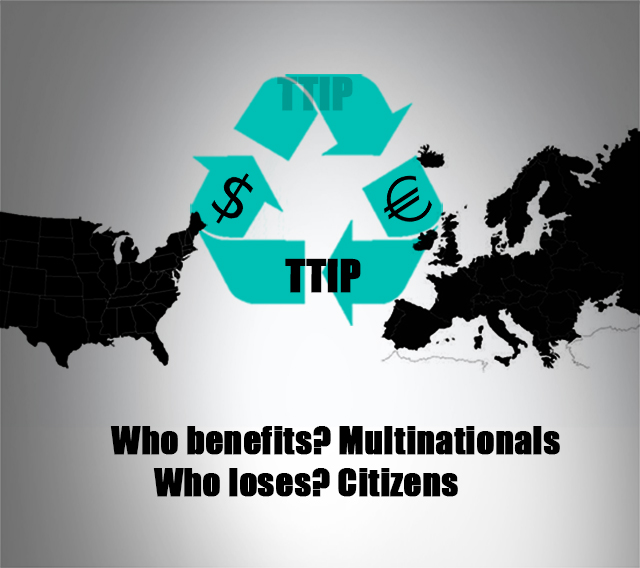Transatlantic Trade and Investment Partnership (TTIP): Who benefits? Who loses?
- Published on Thursday, 15 May 2014 13:25

What is TTIP?
The Transatlantic Trade and Investment Partnership (TTIP) is a trade agreement that is presently being negotiated between the European Union and the United States. It aims at removing trade barriers (tariffs) across economic sectors to create a single market between the EU and US.
Lobbyists on behalf of multinationals are aggressively pushing for TTIP to be signed, claiming that new jobs and economic growth will result. However, a review of TTIP exposes the myths.
A review of TTIP by the Austrian research institute Austrian Foundation for Development Research (OFSE)* has found:
- There are considerable risks associated with removing the trade tariffs and very few actual economic gains in terms of GDP, jobs, trade flows, and real wages.
- The European Commission-endorsed TTIP impact assessments by Ecorys, CEPR, CEPII, and Bertelsmann/ifo contain problematic methodological flaws. None of the studies take into account the social costs of TTIP.
- 80% of the supposed estimated economic benefits depend on the removal or loosening of regulations and standards, which could pose a serious threat to consumer health, public health, and environmental safety.
- An investor-to-state dispute settlement (ISDS) mechanism could result in governments abstaining from enacting regulation that challenges multinationals’ interests.
- TTIP will reduce trade between EU countries by up to 30% as EU countries’ exports won’t be able to compete with cheap imports. A spike in US imports could also bring about trade deficits, creating severe problems for some member states.
- Eliminating tariffs under TTIP will mean losses to public budgets – e.g., customs duties– this would be a 2% loss to the EU budget, or € 2.6 billion a year.
- Unemployment would rise due to job displacement: in 10 years, between € 5-14 billion of unemployment adjustment costs can be expected.
Multinationals have used the ISDS mechanism in other instances, to sue governments before secretive arbitration panels, effectively bypassing the courts and the will of Parliaments. Governments could end up having to pay compensation to multinationals using taxpayers’ money.
*Study commissioned by GUE/NGL




